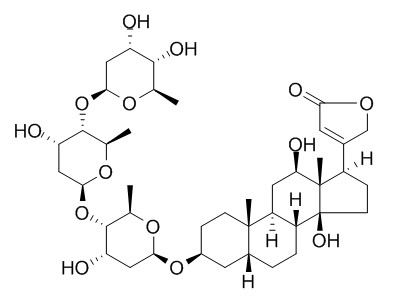Digoxin
Digoxin is a classical Na,K-ATPase inhibitor, with selectivity for the α2β3 isoform over the common α1β1 isoform, used in the treatment of atrial fibrillation and heart failure. Digoxin and other cardiac glycosides can inhibit hypoxia-inducible factor 1 (HIF-1)α synthesis and block tumor growth.
Inquire / Order:
manager@chemfaces.com
Technical Inquiries:
service@chemfaces.com
Tel:
+86-27-84237783
Fax:
+86-27-84254680
Address:
1 Building, No. 83, CheCheng Rd., Wuhan Economic and Technological Development Zone, Wuhan, Hubei 430056, PRC
Providing storage is as stated on the product vial and the vial is kept tightly sealed, the product can be stored for up to
24 months(2-8C).
Wherever possible, you should prepare and use solutions on the same day. However, if you need to make up stock solutions in advance, we recommend that you store the solution as aliquots in tightly sealed vials at -20C. Generally, these will be useable for up to two weeks. Before use, and prior to opening the vial we recommend that you allow your product to equilibrate to room temperature for at least 1 hour.
Need more advice on solubility, usage and handling? Please email to: service@chemfaces.com
The packaging of the product may have turned upside down during transportation, resulting in the natural compounds adhering to the neck or cap of the vial. take the vial out of its packaging and gently shake to let the compounds fall to the bottom of the vial. for liquid products, centrifuge at 200-500 RPM to gather the liquid at the bottom of the vial. try to avoid loss or contamination during handling.
Toxicol In Vitro.2018, 52:94-105
Int Immunopharmacol.2022, 106:108603.
J of Archaeological Science:Reports2024, 53:104298
Biol Pharm Bull.2018, 41(11):1685-1693
Processes2021, 9(11),2065.
Molecules.2023, 28(2):727.
Anticancer Res.2022, 42(9):4403-4410.
Immunopharmacol Immunotoxicol.2024, 46(4):496-508.
Psychopharmacology (Berl).2020, 10.1007
Int J Cosmet Sci.2019, 41(1):12-20
Related and Featured Products
Lancet. 2015 Jun 13;385(9985):2363-70.
Digoxin use in patients with atrial fibrillation and adverse cardiovascular outcomes: a retrospective analysis of the Rivaroxaban Once Daily Oral Direct Factor Xa Inhibition Compared with Vitamin K Antagonism for Prevention of Stroke and Embolism Trial in[Pubmed:
25749644]
Digoxin is a widely used drug for ventricular rate control in patients with atrial fibrillation (AF), despite a scarcity of randomised trial data.
METHODS AND RESULTS:
We studied the use and outcomes of Digoxin in patients in the Rivaroxaban Once Daily Oral Direct Factor Xa Inhibition Compared with Vitamin K Antagonism for Prevention of Stroke and Embolism Trial in Atrial Fibrillation (ROCKET AF). For this retrospective analysis, we included and classified patients from ROCKET AF on the basis of Digoxin use at baseline and during the study. Patients in ROCKET AF were recruited from 45 countries and had AF and risk factors putting them at moderate-to-high risk of stroke, with or without heart failure. We used Cox proportional hazards regression models adjusted for baseline characteristics and drugs to investigate the association of Digoxin with all-cause mortality, vascular death, and sudden death. ROCKET AF was registered with ClinicalTrials.gov, number NCT00403767. Digoxin treatment was associated with a significant increase in all-cause mortality, vascular death, and sudden death in patients with AF.
CONCLUSIONS:
This association was independent of other measured prognostic factors, and although residual confounding could account for these results, these data show the possibility of Digoxin having these effects. A randomised trial of Digoxin in treatment of AF patients with and without heart failure is needed.
Circ Arrhythm Electrophysiol. 2015 Feb;8(1):49-58.
Digoxin and risk of death in adults with atrial fibrillation: the ATRIA-CVRN study.[Pubmed:
25414270]
Digoxin remains commonly used for rate control in atrial fibrillation, but limited data exist supporting this practice and some studies have shown an association with adverse outcomes. We examined the independent association between Digoxin and risks of death and hospitalization in adults with incident atrial fibrillation and no heart failure.
METHODS AND RESULTS:
We performed a retrospective cohort study of 14,787 age, sex, and high-dimensional propensity score-matched adults with incident atrial fibrillation and no previous heart failure or Digoxin use in the AnTicoagulation and Risk factors In Atrial fibrillation-Cardiovascular Research Network (ATRIA-CVRN) study within Kaiser Permanente Northern and Southern California. We examined the independent association between newly initiated Digoxin and the risks of death and hospitalization using extended Cox regression. During a median 1.17 (interquartile range, 0.49-1.97) years of follow-up among matched patients with atrial fibrillation, incident Digoxin use was associated with higher rates of death (8.3 versus 4.9 per 100 person-years; P<0.001) and hospitalization (60.1 versus 37.2 per 100 person-years; P<0.001). Incident Digoxin use was independently associated with a 71% higher risk of death (hazard ratio, 1.71; 95% confidence interval, 1.52-1.93) and a 63% higher risk of hospitalization (hazard ratio, 1.63; 95% confidence interval, 1.56-1.71). Results were consistent in subgroups of age and sex and when using intent-to-treat or on-treatment analytic approaches.
CONCLUSIONS:
In adults with atrial fibrillation, Digoxin use was independently associated with higher risks of death and hospitalization. Given other available rate control options, Digoxin should be used with caution in the management of atrial fibrillation.
Proc Natl Acad Sci U S A. 2008 Dec 16;105(50):19579-86.
Digoxin and other cardiac glycosides inhibit HIF-1alpha synthesis and block tumor growth.[Pubmed:
19020076 ]
A library of drugs that are in clinical trials or use was screened for inhibitors of hypoxia-inducible factor 1 (HIF-1).
METHODS AND RESULTS:
Twenty drugs inhibited HIF-1-dependent gene transcription by >88% at a concentration of 0.4 microM. Eleven of these drugs were cardiac glycosides, including Digoxin, ouabain, and proscillaridin A, which inhibited HIF-1alpha protein synthesis and expression of HIF-1 target genes in cancer cells. Digoxin administration increased latency and decreased growth of tumor xenografts, whereas treatment of established tumors resulted in growth arrest within one week.
CONCLUSIONS:
Enforced expression of HIF-1alpha by transfection was not inhibited by Digoxin, and xenografts derived from these cells were resistant to the anti-tumor effects of Digoxin, demonstrating that HIF-1 is a critical target of Digoxin for cancer therapy.



